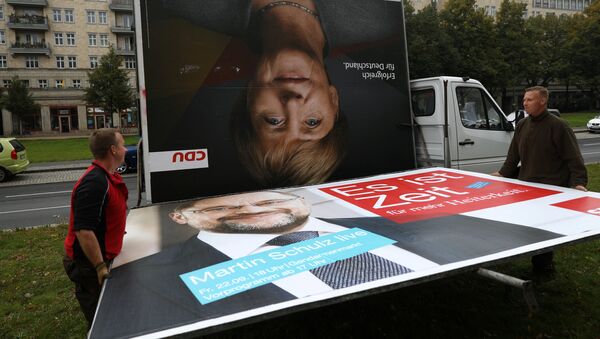Germans went to the polls on Sunday to elect representatives to the national parliament, the Bundestag. Turnout was 76.2 percent, in comparison with 71.5% in 2013.
According to preliminary results, smaller parties have won scores of seats at the expense of Germany's main parties, which suffered their worst result since the 1940's.
German elections: Merkel mob and Social Democrats combined barely reach 50% primary vote. Outsiders thriving, like USA, Brexit, France, NZ!!
— Real Mark Latham (@RealMarkLatham) 25 сентября 2017 г.
Schlechtestes Wahlergebnis für
— AfD Zwickau (@AfD_Zwickau) 24 сентября 2017 г.
— CDU/CSU seit 1949
— SPD seit 1945
Und Tschüss Frau #Merkel…#BTW17
"The worst election result for the CDU/CSU since 1949, and the SPD since 1945. See you, Mrs. Merkel," wrote the local Alternative for Germany (AfD) party in the district of Zwickau, Saxony-Anhalt.
The anti-immigrant, Eurosceptic AfD is now the strongest party in Saxony-Anhalt, and took 12.6% of the vote nationally. However, AfD leader Frauke Petry made a surprise announcement that she is not going to take one of the party's seats in the Bundestag.
The flabbergasted looks on the faces of @AfD leadership after ex-leader @FraukePetry storms out of presser. #DayOne pic.twitter.com/rs7sYFW05A
— Peter Spiegel (@SpiegelPeter) 25 сентября 2017 г.
Germans were late to the 'rise of populist right' party, but they seem to be pushing to the 'populist blow up' stage with german efficiency.
— Matti (@Rauhallinen) 25 сентября 2017 г.
She leaves the party, and the presser. That was unexpected. #Petry
— Janelle Dumalaon (@janelledumalaon) 25 сентября 2017 г.
The entry of the AfD into the Bundestag was greeted by angry demonstrations in Berlin, who oppose the party's anti-immigrant policy.
"Say it loud, say it clear! #Refugees are welcome here!" Bei einer anti-AfD-Demo am #Alexanderplatz #BTW17 @WDR pic.twitter.com/4ZtLPCNHWk
— COSMO (@COSMO__ARD) 24 сентября 2017 г.
Oh my God 😥😡 #BTW2017 #Wahlen #armesDeutschland #UmzugausSachsen? pic.twitter.com/Hh4qGA15gh
— Claudia Schoder (@SchoderClaudia) 24 сентября 2017 г.
The Free Democratic Party (FDP), a liberal party, re-entered the Bundestag after breaking the 5% hurdle. This barrier prevents parties from sitting in parliament unless they get more than 5% of the vote. This time FDP came fourth, with 10.7% of the vote.
Tolles Ergebnis für die Freien Demokraten — mit über 10% wieder im Bundestag. Man kann Wahlen mit der politischen Mitte gewinnen!
— Hans-Peter Semmler (@HPS_BW) 24 сентября 2017 г.
"Great result for the Free Democrats — in the Bundestag again with over 10% of the vote. It's possible to win elections with the political center!"
The biggest losers were the main parties. Although Angela Merkel won a fourth term as Chancellor, her Christian Democratic Union/Christian Social Union (CDU/CSU) grouping took 33.9% of the vote, down 8.6% in comparison with 2013. Martin Schulz's Social Democratic Party (SPD) took 20.5%, down 5.2%.
We're expecting Merkel's post election speech to be largely feuds with sports stars plus some light nuclear brinksmanship.
— Matthew Yglesias (@mattyglesias) 24 сентября 2017 г.
#GermanElections Ma Merkel's face says it all. A win but a bad result and her aura of invincibility is at an end
— Andrew Pierce (@toryboypierce) 24 сентября 2017 г.
As the first exit polls came in, Schulz announced that the SPD won't take part in another "Grand Coalition" with the CDU/CSU. He vowed to "defend democracy" in opposition to the CDU-led government.
Jamaica coalition had 3/1 odds at betting offices half an hour before closing. Could've made some cash.
— Tobias Schneider (@tobiaschneider) 24 сентября 2017 г.
#Germania #Merkel #JamaicaCoalition @annavinci6 @MrTotaman pic.twitter.com/KtFJ0pEzqG
— CoL-Lateral (@COLLATERAL13) 25 сентября 2017 г.
As a consequence, Merkel is tipped to form a so-called "Jamaica Coalition," made up of the CDU, which is associated with the color black, the yellow FDP and the Greens.




